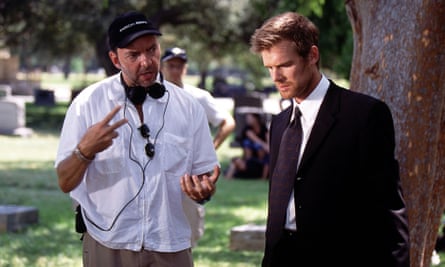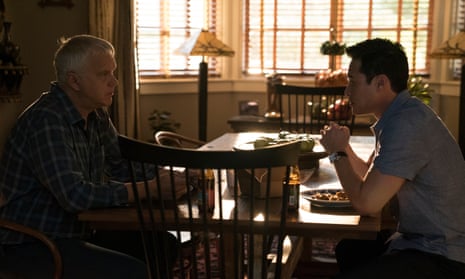There are family dramas, and then there is Six Feet Under. Alan Ball’s series about the lives, loves and lies of the Fisher family, which ran for five years between 2001 and 2005, is the family drama by which all others should be judged. A darkly funny mediation on love and death that could infuriate, but always enthralled right up until the memorable final episode, which provided a flash forward to each character’s death.
Now, after a decade spent among the vampires of True Blood and executive producing the boisterous crime drama Banshee, Ball has turned his gaze back on the American family. His new series, Here and Now, which starts on Sky Atlantic on Tuesday, follows the travails and triumphs of a liberal progressive (and somewhat smug) couple played by Holly Hunter and Tim Robbins and their four children, three of whom are adopted from Vietnam, Liberia and Colombia.
Reviews from the US have been mixed, with suggestions that the show is overstuffed: there is also a subplot involving a Muslim therapist and his family, plus suggestions of a supernatural element involving younger son Ramon. But critics have also found it curiously underpowered for an Alan Ball show.
Ball remains sanguine about the brickbats. “I know some people have said that too much is going on, but I like shows where a lot is happening,” he says on the phone from California. “I’m a huge fan of Game of Thrones and that’s a show which has a huge amount of stuff going on. I think it makes for a richer experience.”
He’s also absolutely fine with suggestions that this is simply a slice of comfort TV for those mourning the election of Donald Trump. “I know that the trailer already had people saying: ‘Oh, this is liberal bullshit propaganda,’ and I found that hilarious. I’m absolutely fine with pissing people off. It’s pretty easy to piss people off in this country right now.”

He wasn’t interested in writing another show about “another white family having white problems” because, he says, there have been a “million of those shows”. Instead, he wanted to look at diversity in a rapidly changing America and examine “what would happen in the sort of family headed up by a couple of people who always wanted to make the world a better place”.
Ball’s own politics are clearly aligned with those of the show’s liberal, ever-concerned Bayer-Boatwright parents: he has no problem with sending up their anxieties. It is arguable that the show’s most successful moments come when it tackles matriarch Audrey’s obsessive attempts to do the right thing, including a sharp conversation in the opening episode between the oldest siblings, Duc and Ashley, about what it was really like to be raised by white parents in progressive Portland.
“Portland has a reputation for being a bastion of progressivism, but it’s got a very sketchy history regarding race,” Ball says. “I thought that that would be interesting to explore: the gap between how people see themselves as liberal and progressive and the reality of their actions. Portland is a great place to live and a progressive town, but it isn’t quite what it aspires to be.”

Ball co-created Here and Now with his Lebanese partner Peter Macdissi (who also stars as therapist Farid Shokrani) and stresses the importance of a diverse writers’ room. “I can’t write from the experience of being African American or Asian or adopted,” he says. “I can’t write those viewpoints authentically so it was very important to have people who could speak to all those experiences.”
He is unbothered about the inevitable comparisons to Six Feet Under, although he stresses that he sees neither that show nor Here and Now as family dramas at heart. “When I think of family dramas, I tend to think of shows that centre on sibling rivalry or health scares, everyday issues that people deal with in their lives. There are so many other shows that tackle those subjects, and tackle them well but that’s not what I was doing with Six Feet Under and it’s not what we’re doing here.”
Ball insists Six Feet Under was a show about death that unnerved some viewers “because in America we’re so in thrall to the cult of youth, we deny death exists”. Here and Now, by contrast, is about anxiety around the tempestuous political situation the US finds itself in. “Trump started talking about wanting a military parade,” he says. “You read that and you find yourself wondering: what kind of world are we living in. It’s beyond parody.”
What of the criticism that, in contrast to the essentially warm Six Feet Under, none of these people are very likable? We cared deeply about the Fishers in all their existential angst, but it’s hard to raise even an eyebrow at the antics of the privileged Bayer-Boatwrights. Ball laughs: “I honestly don’t care if people find them or the show likable. That’s a network TV concept.
“People said American Beauty was filled with unlikable characters. I’d actually be far more worried if people said they were bored or it was boring. But ‘unlikable’ – it really doesn’t bother me at all.”
- Here and Now starts on Sky Atlantic at 9pm on Tuesday 20 February

Comments (…)
Sign in or create your Guardian account to join the discussion